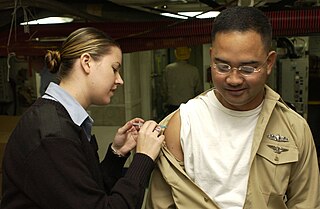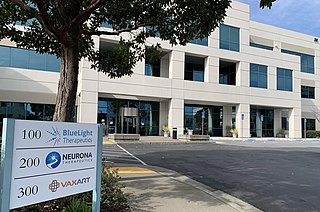Related Research Articles

Incubation period is the time elapsed between exposure to a pathogenic organism, a chemical, or radiation, and when symptoms and signs are first apparent. In a typical infectious disease, the incubation period signifies the period taken by the multiplying organism to reach a threshold necessary to produce symptoms in the host.

Human metapneumovirus is a negative-sense single-stranded RNA virus of the family Pneumoviridae and is closely related to the Avian metapneumovirus (AMPV) subgroup C. It was isolated for the first time in 2001 in the Netherlands by using the RAP-PCR technique for identification of unknown viruses growing in cultured cells. It is the second most common cause after respiratory syncytial virus (RSV) of lower respiratory infection in young children.

Influenza vaccines, also known as flu shots, are vaccines that protect against infection by influenza viruses. New versions of the vaccines are developed twice a year, as the influenza virus rapidly changes. While their effectiveness varies from year to year, most provide modest to high protection against influenza. The United States Centers for Disease Control and Prevention (CDC) estimates that vaccination against influenza reduces sickness, medical visits, hospitalizations, and deaths. Immunized workers who do catch the flu return to work half a day sooner on average. Vaccine effectiveness in those over 65 years old remains uncertain due to a lack of high-quality research.

Flu season is an annually recurring time period characterized by the prevalence of an outbreak of influenza (flu). The season occurs during the cold half of the year in each hemisphere. It takes approximately two days to show symptoms. Influenza activity can sometimes be predicted and even tracked geographically. While the beginning of major flu activity in each season varies by location, in any specific location these minor epidemics usually take about three weeks to reach its pinnacle, and another three weeks to significantly diminish.

Umifenovir, sold under the brand name Arbidol, is an antiviral medication for the treatment of influenza and COVID infections used in Russia and China. The drug is manufactured by Pharmstandard. It is not approved by the U.S. Food and Drug Administration (FDA) for the treatment or prevention of influenza.
A breakthrough infection is a case of illness in which a vaccinated individual becomes infected with the illness, because the vaccine has failed to provide complete immunity against the pathogen. Breakthrough infections have been identified in individuals immunized against a variety of diseases including mumps, varicella (Chickenpox), influenza, and COVID-19. The characteristics of the breakthrough infection are dependent on the virus itself. Often, infection of the vaccinated individual results in milder symptoms and shorter duration than if the infection were contracted naturally.

Vaccine efficacy or vaccine effectiveness is the percentage reduction of disease cases in a vaccinated group of people compared to an unvaccinated group. For example, a vaccine efficacy or effectiveness of 80% indicates an 80% decrease in the number of disease cases among a group of vaccinated people compared to a group in which nobody was vaccinated. When a study is carried out using the most favorable, ideal or perfectly controlled conditions, such as those in a clinical trial, the term vaccine efficacy is used. On the other hand, when a study is carried out to show how well a vaccine works when they are used in a bigger, typical population under less-than-perfectly controlled conditions, the term vaccine effectiveness is used.

Influenza-like illness (ILI), also known as flu-like syndrome or flu-like symptoms, is a medical diagnosis of possible influenza or other illness causing a set of common symptoms. These include fever, shivering, chills, malaise, dry cough, loss of appetite, body aches, and nausea, sneezing typically in connection with a sudden onset of illness. In most cases, the symptoms are caused by cytokines released by immune system activation, and are thus relatively non-specific.

In public health, social distancing, also called physical distancing, is a set of non-pharmaceutical interventions or measures intended to prevent the spread of a contagious disease by maintaining a physical distance between people and reducing the number of times people come into close contact with each other. It usually involves keeping a certain distance from others and avoiding gathering together in large groups.
Vaccine shedding is a form of viral shedding which can occur following a viral infection caused by an attenuated vaccine, which is a specific vaccine technology that uses an attenuated form of a live virus. Illness in others resulting from transmission through this type of viral shedding is rare. A large proportion of vaccines are not attenuated vaccines, and therefore cannot cause vaccine-induced viral shedding.

Neil Morris Ferguson is a British epidemiologist and professor of mathematical biology, who specialises in the patterns of spread of infectious disease in humans and animals. He is the director of the Jameel Institute, and of the MRC Centre for Global Infectious Disease Analysis, and head of the Department of Infectious Disease Epidemiology in the School of Public Health and Vice-Dean for Academic Development in the Faculty of Medicine, all at Imperial College London.

Vaxart, Inc. is an American biotechnology company focused on the discovery, development, and commercialization of oral recombinant vaccines administered using temperature-stable tablets that can be stored and shipped without refrigeration, eliminating the need for needle injection. Its development programs for oral vaccine delivery include prophylactic, enteric-coated tablet vaccines for inhibiting norovirus, seasonal influenza, respiratory syncytial virus, and human papillomavirus. It was founded in 2004 by Sean Tucker.
Allison Joan McGeer is a Canadian infectious disease specialist in the Sinai Health System, and a professor in the Department of Laboratory Medicine and Pathobiology at the University of Toronto. She also appointed at the Dalla Lana School of Public Health and a Senior Clinician Scientist at the Lunenfeld-Tanenbaum Research Institute, and is a partner of the National Collaborating Centre for Infectious Diseases. McGeer has led investigations into the severe acute respiratory syndrome outbreak in Toronto and worked alongside Donald Low. During the COVID-19 pandemic, McGeer has studied how SARS-CoV-2 survives in the air and has served on several provincial committees advising aspects of the Government of Ontario's pandemic response.
Cécile Viboud is a Staff Scientist based in the Fogarty International Center at the National Institutes of Health, where she is part of the Multinational Influenza Seasonal Mortality Study (MISMS). Viboud specialises in the mortality of infectious disease. Viboud was involved with epidemiological analysis during the COVID-19 pandemic.

The Seattle Coronavirus Assessment Network (SCAN) is a public health surveillance program established in response to the COVID-19 pandemic. SCAN originated in March 2020 as a partnership between the Public Health department of Seattle and King County in Washington, USA and the Seattle Flu Study. SCAN's predecessor, the Seattle Flu Study, reported the first known case of community transmission of SARS-CoV-2 in the United States.
Sylvie Champaloux Briand is a French physician who is Director of the Pandemic and Epidemic Diseases Department at the World Health Organization. Briand led the Global Influenza Programme during the 2009 swine flu pandemic. During the COVID-19 pandemic, Briand launched the WHO Information Network for Epidemics which looked to counter the spread of COVID-19 misinformation.
Viral interference, also known as superinfection resistance, is the inhibition of viral reproduction caused by previous exposure of cells to another virus. The exact mechanism for viral interference is unknown. Factors that have been implicated are the generation of interferons by infected cells, and the occupation or down-modulation of cellular receptors.
Vittoria Colizza is an Italian scientist, research director at INSERM and a specialist in mathematical modeling of infectious disease and computational epidemiology. In particular, she has carried out research on the modeling of seasonal and pandemic flu, Ebola and the COVID-19 pandemic.

Shabir Ahmed Madhi is a South African physician who is professor of vaccinology and director of the South African Medical Research Council Respiratory and Meningeal Pathogens Research Unit at the University of the Witwatersrand, and National Research Foundation/Department of Science and Technology Research Chair in Vaccine Preventable Diseases. In January 2021, he was appointed Dean of the Faculty of Health Sciences at the University of the Witwateratand.
References
- ↑ "Helen Y. Chu M.D., M.P.H." UW Medicine.
- ↑ Fink, Sheri; Baker, Mike (March 11, 2020). "'It's Just Everywhere Already': How Delays in Testing Set Back the U.S. Coronavirus Response". The New York Times.
- ↑ "Dr. Helen Chu pivoted pandemic-tracking framework when Covid-19 hit the region". www.bizjournals.com.
- 1 2 3 4 5 Leib, Matthew Macdonald (December 12, 2019). "Faculty Friday: Helen Chu". The Whole U. Retrieved May 6, 2020.
- ↑ "Chu, Helen". Department of Epidemiology. October 3, 2017. Retrieved May 6, 2020.
- 1 2 3 Chu, Helen Y.; Englund, Janet A.; Starita, Lea M.; Famulare, Michael; Brandstetter, Elisabeth; Nickerson, Deborah A.; Rieder, Mark J.; Adler, Amanda; Lacombe, Kirsten; Kim, Ashley E.; Graham, Chelsey (May 1, 2020). "Early Detection of Covid-19 through a Citywide Pandemic Surveillance Platform". New England Journal of Medicine. 383 (2): 185–187. doi: 10.1056/NEJMc2008646 . ISSN 0028-4793. PMC 7206929 . PMID 32356944.
- 1 2 "Helen Chu, MD, MPH: The Seattle Flu Study". HCPLive®. Retrieved May 6, 2020.
- 1 2 3 4 5 Fink, Sheri; Baker, Mike (March 10, 2020). "'It's Just Everywhere Already': How Delays in Testing Set Back the U.S. Coronavirus Response". The New York Times. ISSN 0362-4331 . Retrieved May 6, 2020.
- 1 2 "Leadership Update from the Seattle Flu Study". Leadership Update from the Seattle Flu Study. Retrieved May 6, 2020.
- 1 2 Maxmen, Amy (March 6, 2020). "The race to unravel the biggest coronavirus outbreak in the United States". Nature. 579 (7798): 181–182. Bibcode:2020Natur.579..181M. doi: 10.1038/d41586-020-00676-3 . PMID 32152595.
- ↑ "Seattle lab only uncovered extent of Washington coronavirus outbreak after breaking government rules". The Independent. March 11, 2020. Retrieved May 6, 2020.
- ↑ "The Daily: Why the U.S. Wasn't Ready for the Coronavirus on Apple Podcasts". Apple Podcasts. Retrieved May 6, 2020.
- ↑ Grande, Alison (May 2, 2020). "Remdesivir gets FDA approval, UW researcher reacts". KIRO. Retrieved May 6, 2020.
- ↑ "How Seattle Flu Study defied federal government to test for coronavirus". MyNorthwest.com. March 12, 2020. Retrieved May 6, 2020.
- ↑ "On the Ground With COVID-19 in Seattle". www.medpagetoday.com. March 3, 2020. Retrieved May 6, 2020.
- ↑ Steinhoff, Mark C; Katz, Joanne; Englund, Janet A; Khatry, Subarna K; Shrestha, Laxman; Kuypers, Jane; Stewart, Laveta; Mullany, Luke C; Chu, Helen Y; LeClerq, Steven C; Kozuki, Naoko (September 1, 2017). "Year-round influenza immunisation during pregnancy in Nepal: a phase 4, randomised, placebo-controlled trial". The Lancet Infectious Diseases. 17 (9): 981–989. doi: 10.1016/S1473-3099(17)30252-9 . ISSN 1473-3099. PMC 5573632 . PMID 28522338.
- ↑ Perchetti, Garrett A; Wilcox, Naomi; Chu, Helen Y; Katz, Joanne; LeClerq, Steven; Tielsch, James; Jerome, Keith R; Englund, Janet A; Kuypers, Jane (November 2, 2020). "Human Metapneumovirus Infection and Genotyping of Infants in Rural Nepal". Journal of the Pediatric Infectious Diseases Society. 10 (4): 408–416. doi:10.1093/jpids/piaa118. PMID 33137178.
- ↑ Mazur, Natalie I; Higgins, Deborah; Nunes, Marta C; Melero, José A; Langedijk, Annefleur C; Horsley, Nicole; Buchholz, Ursula J; Openshaw, Peter J; McLellan, Jason S; Englund, Janet A; Mejias, Asuncion (October 1, 2018). "The respiratory syncytial virus vaccine landscape: lessons from the graveyard and promising candidates". The Lancet Infectious Diseases. 18 (10): e295–e311. doi:10.1016/S1473-3099(18)30292-5. hdl:20.500.11820/c0495b39-2301-40af-a023-dfb5c51e6c1c. ISSN 1473-3099. PMID 29914800. S2CID 49300571.
- ↑ Chu, Helen Y.; Englund, Janet A. (August 15, 2014). "Maternal Immunization". Clinical Infectious Diseases. 59 (4): 560–568. doi: 10.1093/cid/ciu327 . ISSN 1058-4838. PMC 4168293 . PMID 24799324.